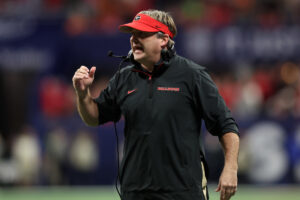
5-Star Class Lineman Faces Backlash From Georgia Fans After Recent Announcement
In the ever-competitive world of college football recruiting, few decisions stir emotions as intensely as a five-star recruit’s commitment—or decommitment—to a major program. Recently, Justus Terry, a 6-foot-5, 275-pound defensive lineman from Manchester, Georgia, made headlines by flipping his commitment from the University of Georgia (UGA) to the University of Southern California (USC). This decision has not only impacted the recruiting landscape but also sparked a wave of reactions from fans, particularly from Georgia supporters who felt a deep sense of betrayal.
Justus Terry’s journey to national prominence began at Manchester High School, where his physical prowess and on-field performance quickly garnered attention. By the time he was 15, Terry had already developed a reputation as a formidable defensive force, weighing in at 270 pounds. His combination of size, speed, and technique made him a coveted prospect among top-tier college programs.
Ranked as the No. 8 overall prospect for the 2025 recruiting cycle, Terry initially committed to Georgia in January 2023. This decision was seen as a significant win for the Bulldogs, who were eager to bolster their defensive line with in-state talent. However, as the recruitment process unfolded, Terry began to explore other options, leading to a series of visits and evaluations that would ultimately influence his final decision.
In March 2024, Terry decommitted from Georgia, signaling the beginning of a new chapter in his recruitment. On the same day, he announced his commitment to USC, citing the university’s top-ranked business school and the appeal of its coaching staff, particularly defensive line coach Eric Henderson, as key factors in his decision .
This move was seen as a strategic choice, balancing both athletic and academic aspirations. USC’s reputation for developing defensive talent, combined with the allure of Los Angeles and its opportunities, presented an enticing package for Terry.
Terry’s decision to leave Georgia for USC did not sit well with many Bulldogs fans. Social media platforms, especially X (formerly Twitter), became battlegrounds for expressions of disappointment and frustration. Fans flooded the platform with messages ranging from supportive to scathing, reflecting the depth of their feelings.
One Georgia fan, JordanCamp, appealed to Terry’s roots, stating, “Wish you the best Justus, home is always home. Relationships always matter.” This sentiment highlighted the personal connection many fans felt with Terry, viewing him as a local hero who had chosen to stay close to home.
In contrast, other fans expressed their discontent more directly, with comments such as, “Think we all know it’s UGA but ROLL TIDE anyway!!” from an Alabama supporter, and “You’re a big time player, and you’ll be in the league in a couple of years! Prioritize who can DEVELOP you the best, not who can pay you the most! Follow your heart,” offering advice tinged with skepticism .
The backlash extended beyond social media, with some fans questioning the integrity of the recruitment process and the influence of factors like the Name, Image, and Likeness (NIL) deals that have become prevalent in college athletics. The perception that financial incentives played a role in Terry’s decision added fuel to the fire, leading to debates about the ethical implications of NIL in recruiting.
Terry’s commitment flip underscores the evolving dynamics of college football recruiting in the NIL era. While traditional factors such as coaching staff, playing time, and academic opportunities remain significant, financial considerations have become increasingly influential.
Programs like USC, with their expansive media presence and resources, are well-positioned to offer lucrative NIL deals that can sway top recruits. This shift has led to concerns among fans and analysts about the potential for “pay-for-play” scenarios, where recruits prioritize monetary compensation over other aspects of their college experience.
For Georgia, a program that has prided itself on developing talent and fostering strong in-state relationships, Terry’s departure is a reminder of the challenges posed by the new recruiting landscape. Despite their success on the field and in recruiting rankings, the Bulldogs must adapt to the realities of NIL and its impact on player decisions.
Justus Terry’s decision to commit to USC over Georgia has highlighted the complexities and emotional stakes involved in college football recruiting. For Georgia fans, it represents a loss of a local talent who seemed destined to don the Bulldogs’ colors. For Terry, it marks the beginning of a new journey that balances athletic ambition with academic goals.
As the recruiting landscape continues to evolve, both programs and fans will need to navigate the intersection of tradition, competition, and the financial realities that now play a pivotal role in shaping the future of college football.





